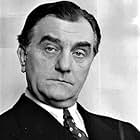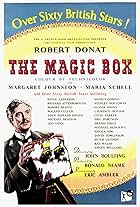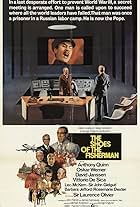A long time-span of Austrian history (from the late 19th century to the years after world war II) is reflected in the ups and downs of a family of piano-makers in Vienna.A long time-span of Austrian history (from the late 19th century to the years after world war II) is reflected in the ups and downs of a family of piano-makers in Vienna.A long time-span of Austrian history (from the late 19th century to the years after world war II) is reflected in the ups and downs of a family of piano-makers in Vienna.
- Awards
- 1 nomination
Photos
Erni Mangold
- Martha Monica Alt
- (as Erna Mangold)
- Director
- Writers
- All cast & crew
- Production, box office & more at IMDbPro
Storyline
Did you know
- TriviaKarlheinz Böhm's debut.
- Alternate versionsThere was an alternative version of this film that was seen several times on New York television in the 1950's. It was both in English and had the title Angel with a Trumpet.
- ConnectionsEdited into Meine Schwester Maria (2002)
Featured review
Loosely adapted from Ernst Lothar's monumental novel and directed by Karl Heitl following an absence of ten years, this is not only the history of an upper-middle-class, piano-making dynasty that covers the period 1888-1938 but is, most importantly, a portrait of a tumbling nation.
Lothar had, for obvious reasons, fled Austria prior to the Anschluss whereas actress Paula Wessely had welcomed it and together with her actor/husband Attila Hoerbiger had appeared in the notorious 'Heimkehr' for director Gustav Ucicky. It was considered, not least by the Americans, that by appearing in Hartl's film they would successfully distance themselves from the Nazi regime and that by playing a Jewess, she would be well and truly denazified. It is safe to say that her stunning and sympathetic performance certainly served its purpose.
Wessely had played the part of Christine in Schnitzler's 'Liebelei' on stage but was passed over for the film as she was not considered photogenic. Although not a beauty she possessed that indefinable quality common to the greatest artistes and seemed somehow lit from within as well as having a mellifluous speaking voice. Under Hartl's sensitive direction she exhibits charm, grace and dignity. It must be said that her character in this is more innocent than in the novel and her relationships with Crown Prince Rudolf and Count Traun are portrayed as platonic. Her link to Rudolf's suicide is of course historically tenuous to say the least.
It is an absolute joy to see the slim and youthful Curd Juergens who had become an Austrian citizen after the War, Maria Schell in her first starring role and Oskar Werner in his film debut. Both Schell and Werner were to reprise their roles in the somewhat limp British remake and Anton Edthofer reappeared as Emperor Franz Josef as he could hardly be improved upon.
The film should really have ended with the bombing but the makers felt obliged to add a Hollywood-style ending complete with heavenly chorus but this is perfectly acceptable for its time as the film itself was designed as a vehicle to aid Austrians to overcome their past whilst the final panoramic view of the city with St. Stephen's Cathedral being rebuilt must have gladdened many a heart. The shot of the angel with the trumpet potruding from the rubble is particularly touching as for Austrians it represented what one film historian has termed 'a symbol of purity, art and heartfelt nationalism expressed through its love of great music'.
Lothar had, for obvious reasons, fled Austria prior to the Anschluss whereas actress Paula Wessely had welcomed it and together with her actor/husband Attila Hoerbiger had appeared in the notorious 'Heimkehr' for director Gustav Ucicky. It was considered, not least by the Americans, that by appearing in Hartl's film they would successfully distance themselves from the Nazi regime and that by playing a Jewess, she would be well and truly denazified. It is safe to say that her stunning and sympathetic performance certainly served its purpose.
Wessely had played the part of Christine in Schnitzler's 'Liebelei' on stage but was passed over for the film as she was not considered photogenic. Although not a beauty she possessed that indefinable quality common to the greatest artistes and seemed somehow lit from within as well as having a mellifluous speaking voice. Under Hartl's sensitive direction she exhibits charm, grace and dignity. It must be said that her character in this is more innocent than in the novel and her relationships with Crown Prince Rudolf and Count Traun are portrayed as platonic. Her link to Rudolf's suicide is of course historically tenuous to say the least.
It is an absolute joy to see the slim and youthful Curd Juergens who had become an Austrian citizen after the War, Maria Schell in her first starring role and Oskar Werner in his film debut. Both Schell and Werner were to reprise their roles in the somewhat limp British remake and Anton Edthofer reappeared as Emperor Franz Josef as he could hardly be improved upon.
The film should really have ended with the bombing but the makers felt obliged to add a Hollywood-style ending complete with heavenly chorus but this is perfectly acceptable for its time as the film itself was designed as a vehicle to aid Austrians to overcome their past whilst the final panoramic view of the city with St. Stephen's Cathedral being rebuilt must have gladdened many a heart. The shot of the angel with the trumpet potruding from the rubble is particularly touching as for Austrians it represented what one film historian has termed 'a symbol of purity, art and heartfelt nationalism expressed through its love of great music'.
- brogmiller
- Mar 19, 2024
- Permalink
Details
- Release date
- Country of origin
- Language
- Also known as
- The Angel with the Trumpet
- Filming locations
- Production companies
- See more company credits at IMDbPro
- Runtime2 hours 18 minutes
- Color
- Sound mix
- Aspect ratio
- 1.37 : 1
Contribute to this page
Suggest an edit or add missing content

Top Gap
By what name was Der Engel mit der Posaune (1948) officially released in Canada in English?
Answer

























